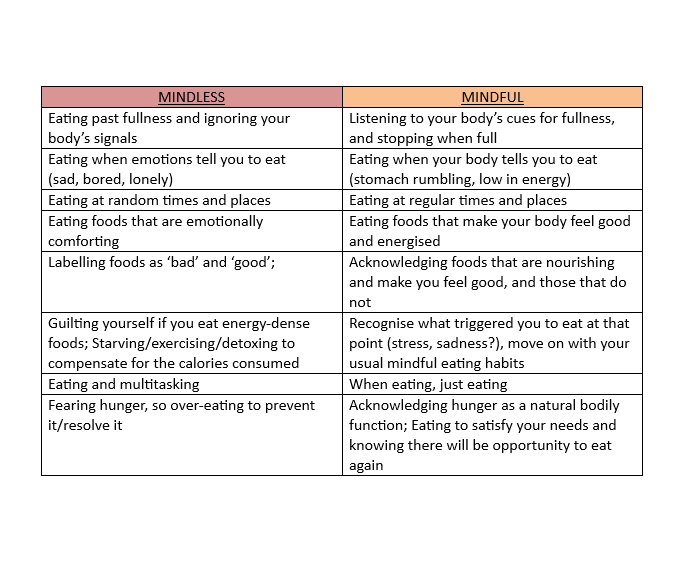MINDFUL EATING – It’s a buzz phrase that we are hearing more and more frequently.
You might be thinking it sounds pretty straightforward… It’s just being ‘mindful’ when I’m eating, right?… But what does that even mean? How do you know if you’re being mindful? And what are the benefits of being mindful when eating?
Well, there’s actually a bit more to it than you think. Let me talk you through the what, where, why and how of Mindful Eating!
The term Mindfulness describes a state of complete awareness, it is paying attention to what is happening in and around your body, without criticism or judgement.
Mindful Eating involves bringing mindfulness into our eating behaviour. It is a state in which we are completely aware of ourselves and all of the sensations that we experience as we eat. When eating mindfully, there is a specific absence of comparison and judgement on ourselves and others. The colour, smell, texture, flavour, temperature and sound of our food are paid full attention when eating mindfully. We also pay attention to our body’s experience and natural cues. Do you feel hunger? Do you feel satisfied? When do you feel half-full? When do you feel like you have eaten past full?
Binge-eating behaviours (repeated, uncontrolled consumption of large amounts of food in short periods of time) are generally brought on by psychological distress. Binge-eating is a common emotional response to overly restrictive dieting, work, emotional or financial stress. Over time, these erratic eating behaviours can lead to high dietary intakes of processed foods which are generally high in sugar, fat and salt, which in turn may lead to weight gain and other health complications. Mindfulness approaches are highly effective in improving psychological distress and emotional responses (i.e. binge-eating).
Cognitive skills that have been taught historically by health professionals to support weight management include meal planning, food records/diaries, calorie counting, and portion control. In the short-term, these interventions may support weight reduction. However, a lifetime of these restrictive eating behaviours can incur a lot of stress and pressure on an individual to maintain a certain diet and/or weight. The restrictive nature of weight-loss dieting often leads people to feel disappointed with themselves if they ‘ruin’ their diet with ‘bad’ foods, or don’t achieve the weight loss they desire. Ongoing self-criticism and guilt felt by individuals who enforce unrealistic dieting pressure on themselves can contribute to psychological distress.
Mindfulness skills are distinctively different to cognitive skills in the context of eating and weight management. Skills involved in Mindful eating include:
- Slowing down the pace of eating (e.g. taking breaks during bites, chewing more slowly, taking a break to breathe and assess fullness);
- Eating away from distractions (e.g. the TV/computer/phone, or eating in the car);
- Be aware of the body’s cues for hunger and fullness. Then utilizing these cues to guide the decision to begin and end eating, as opposed to following a controlled diet plan;
- Acknowledging responses to food without judgement (e.g. likes, dislikes, neutral);
- Choosing to eat food that is both pleasing and nourishing, and using all of the senses while eating;
- Being aware of and reflecting on the effects caused by unmindful eating (e.g. eating out of boredom or sadness, overeating to the point of feeling uncomfortable).
Check out the table below for a comparison on ‘mindless vs mindful’ behaviours that are common in today’s society (with the ‘help’ of some clever marketing strategies – more on that another day!):
Did this help clear up any misunderstandings that you may have previously had on what mindful eating is? We would love to hear your thoughts in the comments below!
Happy Sunday
– Madeline x
Resources:
Dalen J, Smith BW, Shelley BM, Sloan AL, Leahigh L, Begay D. Pilot study: Mindful Eating and Living (MEAL): weight, eating behavior, and psychological outcomes associated with a mindfulness-based intervention for people with obesity. Complementary therapies in medicine. 2010 Dec 1;18(6):260-4.
Framson C, Kristal AR, Schenk JM, Littman AJ, Zeliadt S, Benitez D. Development and validation of the mindful eating questionnaire. Journal of the American Dietetic Association. 2009 Aug 1;109(8):1439-44.
Mathieu J. What should you know about mindful and intuitive eating?. Journal of the American Dietetic Association. 2009 Dec 1;109(12):1982.
Bays JC. Mindful Eating: A Guide to Rediscovering a Healthy and Joyful Relationship with Food–includes CD. Shambhala Publications; 2009 Feb 3.


To be honest I’ve never heard of mindful eating but this really made sense – I’ll be listening to my body much more from now on.